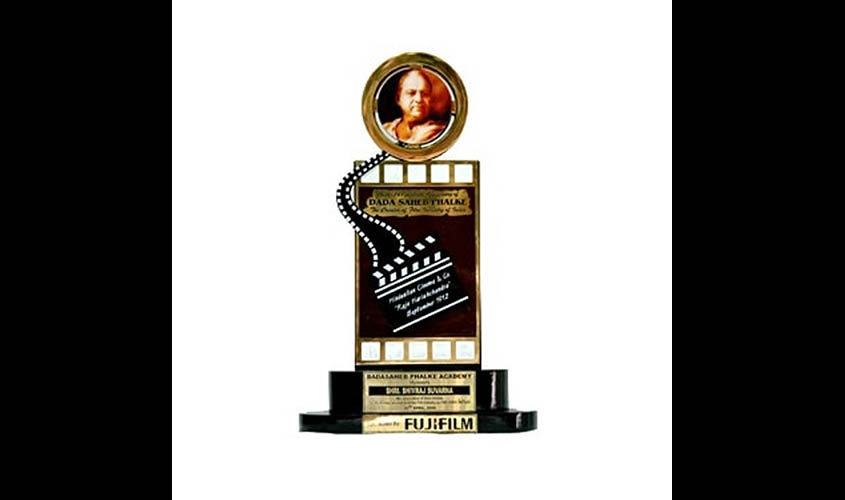Cine superstar, Amitabh Bachchan is, without a shadow of doubt, a worthy recipient of the prestigious Dadasaheb Phalke award for his contribution to the world of cinema. However, senior artistes, mostly women, who have reigned over the silver screen, continue to be ignored by successive governments. The case in point is that Vyjayanthimala, Mala Sinha and Waheeda Rehman have not only been top heroines of their time, but were also amongst the most sought after leading ladies for close to two decades and even beyond.
The award has often created controversy ever since it was first introduced in 1969, when the debate was whether it should have gone to the senior-most filmmaker V. Shantaram or to the first leading lady, Devika Rani, who actually became the inaugural winner. Shantaram was honoured 16 years later, though he was decidedly amongst the most prolific and outstanding movie doyens. It is given that the winners include eminent personalities but those who could not make it despite their immense contributions were in no way less creative people than those who eventually were awarded.
The notable omissions from the list, besides the three top actresses named above, are poets Sahir Ludhianvi and Kaifi Azmi, music composers Shankar Jaikishen, whose melodies continue to dominate any programme of vintage film songs, Sachin Dev Burman, the genius, Guru Dutt, top heroines Meena Kumari and Nargis, rebel actor Shammi Kapoor, the phenomenal Rajesh Khanna, Vijay Anand, singing legends, Mohammad Rafi, Kishore Kumar, Mukesh and Talat Mehmood. They can be still feted if the posthumous category is expanded. Scriptwriters Salim-Javed, who changed the manner in which screenplays were written and played a prominent role in shaping Amitabh Bachchan’s career, can be contenders in the future.
The bias against top women actors is glaringly obvious. Vyjayanthimala was both a talented actress as well as a dancing marvel. Much before specialised choreographers, such as Saroj Khan and Farah Khan came on to the scene, she, with little assistance from the old style Gurus, could improvise and make a song come alive on the silver screen. Her portrayals as a dancer par excellence will always be remembered in Kathputli and Amrapali. She received recognition for her roles in Devdas, Madhumati, Sangam and Jewel Thief, and was the first artiste to turn down Filmfare’s best supporting actress award in the early 1950s for Devdas, where she played the role of Chandramukhi; her contention was that she was the principal female actor in the film.
Mala Sinha paired with every top hero of her time barring Dilip Kumar. Her musical sense and the manner in which she breathed life into challenging roles made her the favourite of filmmakers such as Guru Dutt and B.R. Chopra. She excelled in Pyaasa, Dhool ka Phool, Gumrah, Anpadh, Dil Tera Deewana, Love Marriage and Himalaya ki God Mein. She was always a highly paid artiste, keeping in view her large fan following.
Waheeda was the heartthrob of millions. She was groomed by Guru Dutt, who was virtually obsessed with her. He cast her in pivotal roles in Pyaasa, Kagaz ke Phool and Sahib Bibi aur Ghulam. She excelled in virtually every portrayal and her high point was the acclaim she received for Dev Anand’s Guide. After that, there was no looking back and she continued to dominate the world of cinema with her powerful performances in Teesri Kasam, Ram Aur Shyam and Khamoshi. Her snake dance in Guide became a talking point for many years.
Amitabh Bachchan has a come a long way from the days when he grew up in Lutyens Delhi with Rajiv and Sanjay Gandhi, as also Adil Shahryar, son of the late Mohammad Yunus. His earnest desire was to join films but there was no one to facilitate this aspiration. Actor, filmmaker Sunil Dutt had once mentioned to me that in the late 1960s Amitabh arrived in Bombay with two letters in hand, written by Prime Minister Indira Gandhi; one was for Nargis, a close friend of Indira and the other for K.A. Abbas, who was both a filmmaker and script and storywriter for many Raj Kapoor movies. On the insistence of his wife, Nargis, Sunil Dutt cast Amitabh in his Reshma Aur Shera while K.A. Abbas signed him for Saat Hindustani. Dutt recalled that when he asked Amitabh what he thought was his greatest asset as an actor, the prompt reply was his baritone voice. The veteran then point blank informed him that in his film, he would play the role of a deaf and dumb character. For many years thereafter, the Blitz a leading weekly, referred to him as the “Sarkaari made Hero”.
In 1984, Amitabh was chosen by Rajiv Gandhi to contest the Lok Sabha elections from Allahabad against H.N. Bahuguna. This was done despite the fact that Indira Gandhi had advised Rajiv never to bring “Teji’s (Teji Bachchan) son into politics”. The superstar became a power centre in UP’s politics, with his name also figuring prominently when the Bofors scandal exploded. Rajiv had no option but to ask him to resign from the Lok Sabha.
After Rajiv’s gory assassination, there was a fallout between the Gandhis and the Bachchans. The reason has always been a subject of speculation, but the actor slowly gravitated towards the saffron brigade, becoming a brand ambassador for Gujarat. He is considered to be close to Narendra Modi.
However, Amitabh is not only amongst the finest actors but a role model for generation next. Between us.

